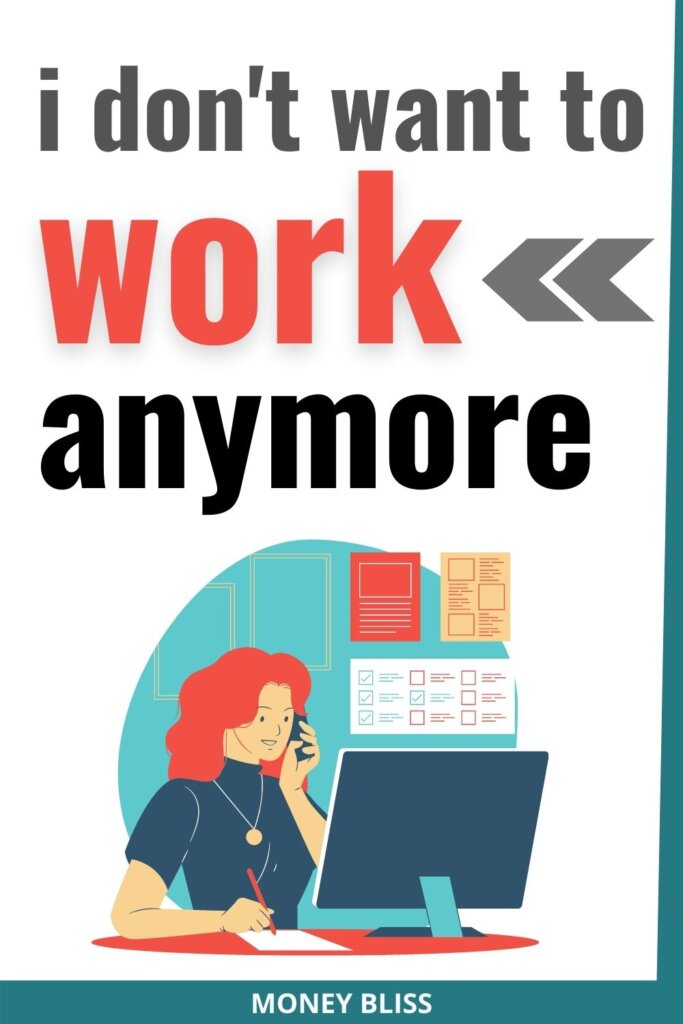10 Overwhelming Reasons for I Don’t Want to Go to Work
Inside: This guide will help you identify the reasons why I don’t want to go to work, and provide tips on how to reduce stress and improve your productivity.
We’ve all been there. You wake up in the morning, and the last thing you want to do is go to work.
You would rather stay in bed all day or curl up on the couch with a good book or movie.
But you can’t because you have bills to pay and responsibilities that won’t just go away because you don’t feel like dealing with them.
We all have days (and sometimes even weeklong stretches) when we really don’t want to go to work.
Do you feel like you may be the only one in this situation?
If you are tired of feeling overwhelmed and stressed at work, then it is time to take action.
Learn the top reasons why we don’t want to go to work.

Is it normal to not want to go to work?
Yes, it is normal to not want to go to work from time to time.
Everyone needs a break from work, especially if the job involves long hours and challenging tasks. People may not want to work if they are feeling low or uninterested in their job.
If this feeling lingers, you must take the time to assess why and take the necessary steps to make the job more attractive.
It might involve making some changes to the current situation or even making a career change.
What are the top reasons for not wanting to go to work?
1. Tiredness: Not getting enough sleep or feeling exhausted can make it harder to get motivated and out of bed for work.
2. Work Fatigue: Feeling overwhelmed or burnt out from work can lead to a lack of motivation.
3. Stress: Long-term stress can lead to mental and physical health issues, making it harder to face getting back to work.
4. Job Dissatisfaction: Not liking your job can be a major barrier to wanting to go to work.
5. Workplace Issues: Unsatisfactory expectations, disagreements, or differences in working styles can cause conflict.
6. Unsupportive Work Culture: Poorly managed, unsupportive, or even discriminatory culture in the workplace can make it difficult to show up.
7. Lack of Meaning: Not finding meaning in the work you do can leave you feeling unengaged and unmotivated.
8. Job Stagnation: Feeling stuck in a role without growth or progression can lead to feelings of despondency.
9. Feeling Overwhelmed: Either by job expectations or deadlines.
10. Feeling Unappreciated: Like your work doesn’t matter.
10 overwhelming reasons why you do not want to go to work today

It is not uncommon to feel like you do not want to go to work.
In fact, many people feel this way at some point in their careers.
There are several reasons why you may not want to go to work, including:
1. Toxic workplace environment
Toxic workplaces are becoming increasingly common, and it can be difficult to cope with the everyday stress of working in an unhealthy environment.
Common signs of a toxic workplace include:
- lack of communication
- cynicism and dishonesty
- maltreatment of employees
- overworking
- micromanagement
Studies have shown that toxic workplaces can lead to mental and physical health issues such as substance abuse, depression, and burnout.1
By being aware of the signs of a toxic workplace and taking action, you can make sure your work environment is one where everyone feels safe and appreciated.
2. Unhappy coworkers
The consequences of having unhappy coworkers at work can be far-reaching and damaging.
It can lead to tension between employees, poor morale and productivity, and even employees leaving the organization.
Unhappy coworkers can affect the overall company culture by creating a toxic and hostile work environment that can lead to increased stress, burnout, and turnover. Additionally, it can lead to a decline in customer service, reduced innovation, and damage to the company’s reputation.
Unhappy coworkers can also affect the mental health of their colleagues, leading to depression, anxiety, and other psychological issues.
3. Lack of motivation

The lack of motivation is real and it leads to feeling exhausted, stressed, and even depressed.
This can ultimately cause a decrease in interest in the job, resulting in difficulties in waking up and going to work. And finding good excuses to miss work on short notice.
You need to search for the lack of motivation to go to work. Is it money related? Do you hate your job?
Taking a day off to recharge can help you come back to work with a better outlook and more energy.
4. Heavy workload
A heavy workload is when an individual has too much work to do and is unable to complete it in a timely and efficient manner.
This can be caused by a variety of factors, such as a lack of resources, an inefficient work process, or an unreasonable amount of expectations set by a supervisor.
Regardless of the cause, a heavy workload can cause extreme stress and burnout, which can lead to a decrease in productivity and eventually to a decrease in job satisfaction.
It is important to recognize when your workload is becoming too much and to take steps to address the situation.
This may require taking a break, delegating tasks, or seeking help to alleviate some of the pressure.
5. Poor management

Poor management can be seen in a variety of ways, from bosses who micromanage their employees and expect perfection from them to bosses who exhibit favoritism and treat their employees unfairly.
This can lead to a lack of motivation, a feeling of being unappreciated, and a feeling of being disconnected from productivity and purpose.
Employees may feel like their efforts are not being adequately rewarded, or that their contributions are not being adequately recognized.
They may feel like their ideas and input are not being taken seriously or valued. In addition, some employees may feel that they are being unfairly treated or that their boss has favorites, leading to feelings of resentment.
6. Unreasonable expectations
Unrealistic expectations can lead to unrealistic goals and ambitions that have little chance of being met.
When these expectations are not met, it can lead to feelings of disappointment, frustration, and even anger. This is something I personally have struggled with.
This can cause stress and lead to burnout as well as a lack of motivation.
Unrealistic expectations can also lead to a lack of acceptance of the current reality. People may feel as if the job they have is not good enough and that they deserve something better. This can lead to a feeling of stagnation, as well as a lack of appreciation for the job that they do have.
In order to combat unreasonable expectations, it is important to be realistic about what you can achieve by having pragmatic goals and expectations to keep motivation and morale high.
7. Poor work-life balance

This is caused by an overworked culture where the emphasis is on long hours and overtime and not enough on rest, relaxation, and leisure activities.
This can be due to a lack of flexibility at work, where employees are expected to work regular and long hours without the ability to take breaks or take time off.
Ultimately, a poor work-life balance leads to a lack of satisfaction with work and a feeling of being overworked and undervalued, which can lead to an unwillingness to go to work.
8. Stressful environment
A stressful environment is a situation where the work environment does not provide employees with the necessary support and resources to perform their job satisfactorily.
This can include a lack of team cohesion, a lack of organization, or an inadequate office setup. This can lead to feelings of isolation, unvalued, and even bullying.
When a person is in a stressful environment, it can lead to physical and emotional distress.
When these factors accumulate and become too much to handle, it can lead to employees no longer wanting to go to work and feeling unmotivated. This can lead to decreased productivity, lower morale, and a greater chance of burnout.
9. Long hours

The long hours at work can be grueling, especially when you’re constantly working overtime. There seems to be a trend of working over 50 hours per week (source).
You may find yourself feeling tired, stressed, and overwhelmed, with little time left for yourself or your loved ones.
It can be easy to get caught up in the “just one more email” cycle, particularly when you’re waiting on someone else to get back to you or when it seems like there will be a lot of extra work in the morning if you don’t take care of it now.
To prevent burnout, it’s important to set boundaries and create a better work-life balance.
10. Ineffective communication
One of the major effects of ineffective communication on work is decreased motivation and productivity.
Poor communication can lead to misunderstandings, hurt feelings, and a lack of trust between employees, resulting in an environment of resentment and frustration.
This can lead to employees feeling unappreciated and undervalued and, eventually, they may lose the desire to work and become unproductive.
When communication isn’t clear, misunderstandings and disagreements can arise, leading to tension and affecting team morale.
This post may contain affiliate links, which helps us to continue providing relevant content and we receive a small commission at no cost to you. As an Amazon Associate, I earn from qualifying purchases. Please read the full disclosure here.
Get the step-by-step guide Caitlin Pyle used to build a thriving at-home business making a full-time income!
A booming legal industry means that transcript proofreaders are in higher demand than ever...
How to deal with this “don’t want to work” situation

It is very common to have days (or even periods) when you don’t feel like going to work. In fact, it’s probably more common than feeling motivated to go to work.
However, if this feeling lasts for more than a day or two, it can start to have a negative impact on your life.
Here are the steps to get to the root cause of the issue.
1. Recognize the cause of the problem
The root cause of the situation is that something is preventing you from wanting to go to work, such as stress, a lack of enjoyment with the workplace or coworkers, or something else.
To recognize it, you need to take some time to think about why you don’t want to go to work and narrow down your answer.
Once you’ve determined the root cause of your issue, you can then work on finding solutions and increasing your motivation.
2. Take Action to Eliminate the Stressor
Start by assessing your daily routine. Make sure you are prioritizing your tasks, working efficiently, and taking breaks throughout the day.
Talk to your employer. Explain your situation and see if they can help you find a solution.
While talking to your employer may be difficult, they are probably clueless about how you feel. Just be careful not to say something detrimental that the Human Resources Dept can use against you and fire you.
If you’re feeling stressed and overwhelmed due to your job, it’s time to take action to eliminate the stressor. That may mean finding a new job.
3. Talk to Your Boss About Options for Flexibility

This may be one of the hardest steps.
Start by expressing your concerns to your boss. Be honest and clear – explain that you feel overwhelmed and are not comfortable with the current situations at your employment.
Propose some ideas of how you can make your job more enjoyable and manageable. Suggest ideas like flexible work hours, more challenging tasks, or more diverse tasks.
Ask your boss what other options may be available to you in terms of flexibility.
Listen to your boss’s response. Work together with your boss to come up with a plan that works for you and the company.
4. Make Time for Self-Care
This is one of the most important steps that you can do.
Here is a list of ideas for self-care:
- Make a list of self-care strategies that you can afford to do regularly, such as meditation, massage, painting, or reading.
- Prioritize “me time” by setting aside at least 20 minutes each day to practice self-care.
- When feeling overwhelmed, talk to someone about it, such as a therapist or a trusted friend or family member.
- Schedule regular days off from work to rest and recharge.
- Set boundaries and protect your personal time by scheduling regular breaks throughout the day and week.
- When feeling tired or overworked, try to incorporate fun activities into your daily routine.
- Evaluate your daily routine and prioritize efficiency, leisure, and rest.
Remember, that self-care will help you keep that work-life balance in check.
5. Take a Break Whenever Possible

Breaks can provide a much-needed respite from the stress and allow you to return to a task or project with a fresh perspective and renewed energy.
These regular breaks throughout your day can also help to maintain your focus and stay on top of tasks.
For example, setting aside time for a coffee break, a walk, or just a chat with a friend can be a great way to take a break from work and refocus.
Also, actually using your allotted vacation days can be beneficial for both your physical and mental health. This can give you a much-needed break from your daily routine and help to keep your perspective positive, so you don’t lose sight of why you love what you do.
6. Create a Support System
Reach out to family and friends.
Talk to your support system and see what suggestions they have about your job situation.
They may simply offer to meet you after work for dinner or a workout to help make the workday seem less boring and difficult. Family and friends also have good advice when it comes to time to switch jobs or find a new career.
7. Take Advantage of Available Resources

Also, employers have many resources to help their employees make their job better.
They can provide training, give feedback, and make suggestions.
If you’re struggling to cope mentally or emotionally, it can be helpful to see a mental healthcare provider and discuss your concerns with them. This is a resource most companies provide.
Employers can also provide tools and resources to make sure you are working at the best capacity. Check with your HR department.
8. Utilize Tools to Manage Stress
Tools can be a great way to manage stress in any situation.
Here are some steps to help you manage your stress levels:
- Make use of calendars, planners, and organizational tools to keep track of your tasks, deadlines, and goals.
- Use time-tracking and time-management tools to analyze how you’re spending your days and adjust accordingly.
- Utilize stress-relief tools and apps that offer guided relaxation exercises and meditations.
- Drink plenty of water and proper nutrition to ensure you’re getting the right fuel for your day.
These are small steps that will have an amazing outcome on your health.
9. Have a Positive Mindset

Having a positive mindset can help you deal with the situation of working in a job that you may not be happy with.
When faced with a job that you don’t enjoy, it can be helpful to focus on the small positive aspects of the job, such as having a favorite coffee in the office or listening to calming music on the way home.
Separating work from the rest of your life will make the biggest impact.
You need to make sure you do not take work home. Then, partake in a daily hobby to take your mind off work.
Also, setting up a side hustle can also give you a break from the stress of the job and provide respite when needed.
10. Have Clear Expectations and Expectations
By having clear expectations and standards, it becomes easier to identify where one may be struggling and make the necessary changes to stay on track.
Also, your employer must have clear expectations about what is expected of you at work.
This will help to ensure that you are meeting the expectations of both you and your employer.
More often than not, the lack of communication is the root cause of the stress and can be easily avoided.
Bookkeeping is the most stable, reliable & simple business to own. This is how to make a realistic income -either part-time or full-time.
Find out TODAY if this is THE business you’ve been looking for.
How can I balance my work and personal life?

Here are some ways to improve your work-life balance:
- Adjust your work hours or request flexible working: Start a conversation with your boss to discuss your options for flexible working. This could include remote working, split shifts, or reducing your working hours.
- Take up a hobby: Find something you enjoy that relaxes you and run with it. This can help you achieve a healthier balance in life. You could even explore starting a side hustle.
- Evaluate your priorities: Take the time to evaluate your priorities both at home and at work. This will help you make better decisions and know when to say no.
- Take regular breaks: Schedule time throughout the day and week to take breaks. This will help you recharge and re-enter the workplace feeling happy and motivated.
- Ask for help: If you have a partner, have an honest discussion about your struggles. If you don’t have a partner, think about who you can reach out to for help. Consider joining a local babysitting co-op or nanny share to alleviate some stress during your time off.
What can I say if I don’t want to go to work?

Honesty is always the best policy.
Yet, many people feel the need to use one of the good excuses to miss work.
In reality, what you want to tell your employer is:
- I’m feeling low and need some time to take care of myself.
- I’m feeling overwhelmed and need some time to relax.
- Today, I’m not feeling motivated and need some time to refocus.
- I’m feeling stressed and need some time to de-stress.
- I’m feeling unappreciated and need some time to reassess.
- This job is too much right now; I’m feeling overwhelmed and need a break.
- I’m feeling burnt out and need to recharge.
- I’m feeling exhausted and need some time to recuperate.
- Right now, I’m feeling uninspired and need some time to rekindle my passion.
- I’m feeling frustrated and need some time to reflect.
FAQ
Burnout Updates to I want to go to Work

If you’re feeling overwhelmed and stressed at work, it’s important to take action.
This guide has helped you identify the reasons why I don’t want to go to work, and provided tips on how to reduce stress and improve your productivity.
Do your best to work when scheduled, and try to find ways to enjoy your job.
You may have to dig into ways you can really quit and walk away with I don’t want to work anymore. But, for today, you need to overcome your feelings and emotions.
With a little effort and a mindset change, you can find satisfaction in your 9-to-5 job.
Source
- Office of the Surgeon General. Framework for Workplace Mental Health & Well Being. https://www.hhs.gov/sites/default/files/workplace-mental-health-well-being.pdf. Accessed December 18, 2023.
Did the post resonate with you?
More importantly, did I answer the questions you have about this topic? Let me know in the comments if I can help in some other way!
Your comments are not just welcomed; they’re an integral part of our community. Let’s continue the conversation and explore how these ideas align with your journey towards Money Bliss.




